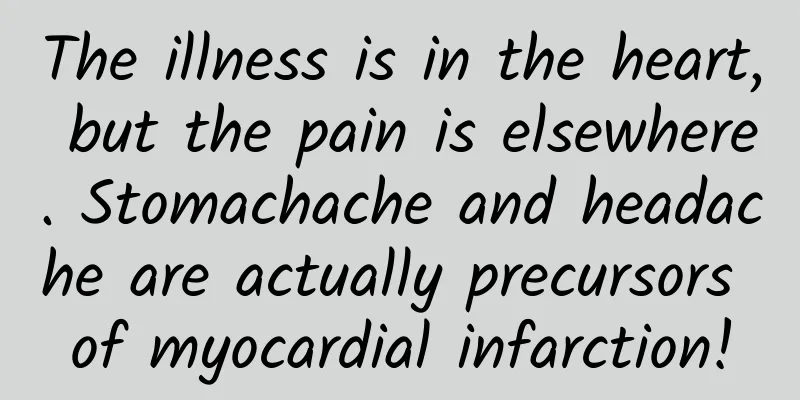The illness is in the heart, but the pain is elsewhere. Stomachache and headache are actually precursors of myocardial infarction!

|
Audit expert: Wang Xin Deputy Chief Physician, Department of Cardiology, Jilin People's Hospital Winter is a high-risk period for sudden myocardial infarction. Clinical data show that about 1 million patients suffer from acute myocardial infarction in China every year. The China Prospective Research on Chronic Diseases Project once released a set of research data showing that the number of deaths among cardiovascular disease patients in China in winter is 41% higher than in summer. China has designated November 20th of each year as the " Chinese Myocardial Infarction Treatment Day ". "1120" just represents the "two 120s" that can treat myocardial infarction in a timely manner. Do you know what these "two 120s" mean? To answer this question, we first need to understand what myocardial infarction is. Source | pixabay Will falling temperatures increase the risk of heart attack? Myocardial infarction generally refers to acute myocardial infarction, which is myocardial necrosis caused by acute and persistent ischemia and hypoxia of the coronary arteries. Clinically, there are often severe and persistent pain behind the sternum, which cannot be completely relieved by rest and nitrates. So you may ask, what is the coronary artery? Why does a decrease in its blood supply lead to myocardial hypoxia? The coronary artery is the artery that supplies blood to the heart. It originates from the aortic sinus at the root of the aorta and is divided into two branches, the left and right branches, running on the surface of the heart. It is the main force to ensure that there is enough blood in the heart. These nutrients are transported to the heart with blood. When the blood supply decreases, the important nutrient for heart work, oxygen, will also be greatly reduced. Coronary artery origin | Baidu Encyclopedia In addition to insufficient blood supply caused by coronary artery blockage, previous heart disease, hypertension, diabetes, dyslipidemia, overweight or obesity, smoking, unreasonable diet, emotional excitement, weather changes, etc. may be the causes of acute myocardial infarction. Everyone should pay special attention to the onset of acute myocardial infarction in the cold winter. When blood vessels contract and blood pressure increases in low temperatures, local blood flow will be affected. If a blood clot is formed locally, the chance of myocardial infarction will greatly increase. According to researchers from the London School of Hygiene and Tropical Medicine, the risk of myocardial infarction increases by 2% for every 1 degree Celsius drop in temperature, with people aged 75 to 84 with coronary heart disease being more susceptible. Source | pixabay Therefore, middle-aged and elderly people and those with cardiovascular and cerebrovascular diseases need to be more vigilant! Due to age and illness, the blood vessels of these people are more fragile than those of other people, so they are more likely to be "targeted" by myocardial infarction. What are the symptoms of a heart attack? The most typical symptom of myocardial infarction is severe chest squeezing pain or a feeling of suffocation, mainly in the precordial area or behind the sternum, which usually lasts for more than 30 minutes, and is accompanied by sweating, abdominal pain, shortness of breath, and arrhythmia (including too slow or too fast). Some patients also have atypical symptoms such as stomach pain, shoulder pain, headache, and even toothache. If these "disguised" symptoms appear, everyone should pay attention to them in time to avoid delaying treatment. Sources of typical symptoms of myocardial infarction | Chinese Stroke Society The trend of younger myocardial infarction incidence in recent years is also worthy of attention. The incidence of myocardial infarction in people under 45 years old is increasing year by year! In the summer, when the temperature is high, sweating is frequent, and the blood is viscous, strenuous exercise and drinking a large amount of cold drinks in a short period of time may increase the risk of myocardial infarction. Myocardial infarction is not an "old age disease", so even young people should not take it lightly. Regular work and rest, reasonable and moderate exercise, and strengthening their own cardiopulmonary function can effectively reduce the risk of myocardial infarction. What should I do if I have a heart attack? Myocardial infarction occurs quickly. If rescue is not timely, it may be fatal in a short period of time. Therefore, early detection and early rescue are necessary! This brings us back to our discussion at the beginning: What do the "two 120s" in "1120" mean? The first "120" means that if you have acute chest pain, you should call 120 immediately. At the same time, the patient should remain quiet and reduce activity. If there is oxygen inhalation equipment at home, oxygen should be used immediately to relieve symptoms. Nitroglycerin or aspirin should be taken sublingually or orally immediately, but you need to be alert to the occurrence of hypotension. Family members can help patients measure blood pressure. If cardiac arrest occurs, chest compression and artificial respiration should be performed immediately, and the cycle should be repeated until the heartbeat recovers or the 120 ambulance arrives. The second "120" means that patients with myocardial infarction need to be effectively treated within the golden 120 minutes. Source | pixabay Although myocardial infarction is terrible, it is treatable and preventable. When a myocardial infarction occurs, the above "two 120s" should be followed, and timely treatment should be received by the doctor. After the condition stabilizes, coronary artery intervention or thrombolytic therapy can be used to ensure that the blood vessels continue to supply oxygen to the myocardium normally. After being discharged from the hospital, patients with myocardial infarction also need to take medication on time, have regular follow-up visits, and exercise regularly. In addition, "prevention" is also an important measure for us to protect ourselves from myocardial infarction. Usually we should avoid emotional excitement to prevent large fluctuations in emotions from causing vascular spasms and sudden myocardial infarction. At the same time, it is also important to maintain a healthy diet. A large intake of high-fat and high-salt foods will make the blood thick, clog blood vessels, and cause myocardial infarction. In addition, good sleep and persistent exercise are also key to preventing myocardial infarction. When the body's immunity is improved, the heart will naturally be stronger. Finally, I remind everyone again to prevent, detect and treat early, and live a healthy life every day. |
>>: In the movie "Man Jiang Hong", cherries are rare? In ancient times, this was true.
Recommend
Can "rice" cure sprained ankles? Don't disbelieve it, it's true!
Author: Zhou Mouwang, Chief Physician, Peking Uni...
Are today's fruits and vegetables tastier than before? Is there any scientific evidence to support this?
Image source: Giphy When you look at the rows of ...
Hunan Satellite TV suffered a setback. Will Mango TV, which has been broadcasting exclusively for two years, be the lifeline of Hunan Radio and Television?
"Hunan Satellite TV's programs don't...
Who was the ancient human with the largest brain capacity in the Middle Pleistocene? The answer is revealed!
Human brain capacity is closely related to intell...
Are sprouted potatoes poisonous? Eating these 9 foods incorrectly can cause "poisoning", so be careful when eating them!
Recently, the news #Girl fainted and was sent to ...
Are email open rates plummeting and undervalued?
A friend recently told me an interesting phenomen...
SAIC Motor delivered 750 “government reception vehicles” to the CIIE
(October 12, 2024, Shanghai) Today, the "Del...
Download the full set of 2020 Suntech Financial Management Course videos
Download the full set of 2020 Suntech Financial M...
LeTV launches a super combination punch to impact traditional e-commerce festivals
TVs are reduced by 500 yuan, mobile phones are re...
Why aren’t second-hand iPhones popular?
According to relevant media reports, Apple is prep...
Read QQ messages using Python
Read QQ messages using Python After the last arti...
The iOS promotion and operation master gave me a sudden enlightenment: how to tap into iOS channels, etc.
Question 1: I don’t know where to tap into the iO...
Once a day versus once a week, is washing more often healthier?
Are people who take a shower once a day healthier...
How to accurately target maternal and child products? How to promote the driving training industry?
After the college entrance examination every year...









